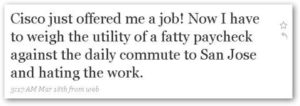5 ways social media is harming your job search
Social media platforms like LinkedIn are great for building your personal brand and sites like Twitter and Instagram can give you an insight into the company culture and activities of prospect companies you want to work for. Employees and recruiters use social media to recruit and screen potential candidates and to find employees with well-rounded lifestyles or specific traits they’re looking for. Are you using social media to your advantage? There are a lot of things that job seekers are doing on social media that are hurting their chances of getting hired. We have put together a list of things that you should stop doing that are hurting your chances of getting hired.
Complaining about your job or your boss
Your boss micro-managing or nagging you? Is your colleague getting on your nerves? We get it, we all have bad days at work. But ranting about it on social media is not the best way to go. No company is perfect, venting about your boss or co-workers online not only gives them a bad name but it gives you a bad name too. A future potential employee might see it and decide that you’re not worth hiring since you have badmouthed past employers. Remember once you hit that post button you can’t take it back. You could post things in the heat of the moment but once it’s out there it’s out there forever. Even if you delete it people can take screenshots or forward the post to others. Don’t end up like Connor Riley who ruined her job prospects with Cisco after tweeting about how she was weighing her options and would probably hate the work. A Cisco employee discovered the tweet and let her know that they’ll be passing on the details onto the hiring manager and needless to say she didn’t get the job. Avoid ending up like Connor Riley and keep rants about your job and co-workers offline.


Posting tasteless/ inappropriate material
Comments meant to offend someone or a group of people could cost you your job. Take Nancy Salem for example who lost her job as a pre-school teacher after her anti-Semitic tweets were discovered. These were old tweets that she didn’t think would ever be discovered and would cost her, her job. Just because you have deleted something online doesn’t mean that it is gone. Once it’s out on the internet it is there forever and it can come back to haunt you like it did for Nancy. You should use your social media presence to create a positive personal brand. Try to keep your posts professional. Use platforms such as Twitter and Instagram to show interest in the industry you want to work in. Take photos and tweet about industry-related events, trade shows you’re attending. Just read an interesting article about a new development in your industry? Tweet about it. Twitter and LinkedIn are great platforms to show off your expertise. On LinkedIn join relevant groups, post frequently, engage with others working in your industry and write articles and create discussions.


Poor communication
On LinkedIn, you should write in a more formal tone because it is a place for professionals. On Facebook and Twitter, you can afford to be more casual with your tone voice. You should also avoid using text language on any social media platform. It may seem convenient because it seems like a faster way to write out your message, but it just comes across like you have poor communication skills and less professional. You’re better off typing out spelling everything out, otherwise, you could be losing jobs over it. A survey by Jobvite showed that a large number of employers look negatively upon poor spelling and grammar on social media.
Not updating your profile information
Make sure that your professional profiles on LinkedIn up to date with a professional profile photos your contact details and current job title. Are you looking for a new job? Let recruiters know! On the “Career Interest” section change your status to ‘actively looking’ to let recruiters know that you’re searching. Specify the location what type of jobs you’re looking for so that you only get contacted about things that are relevant to your needs. Don’t worry about your current employers seeing that you’re searching for another because they won’t be able to see it unless they have a LinkedIn Recruiter account. You’re selling yourself short if you’re not updating your profile with basic information and your latest skills and projects.
Not changing your privacy settings
You may think that you’re only posting photos your weekend activities to just your Facebook connections. But often people you don’t know can see your photos that you’re tagged in or view your posts. Privacy is an issue on Facebook, in general, but it’s even more of an issue when you’re job searching. To avoid some of the mistakes we have mentioned above make sure only friends can see your photos, your religious and political views, your posts and posts you have been tagged in. And delete any inappropriate Facebook apps. You could also make your Twitter account private. On LinkedIn, you can control who can view your profile photo and information and you have the option to be visible or not, who sees your posts and your list of connections. For the best security, consider only letting first-degree connections see your picture. If you’re looking for a job it may be beneficial for your connections to see your updates.
Nothing on the internet is truly private so you should always be mindful of what you share. You should Google your name and see what information about you is out there already. It’s easy for employers to find information you may have preferred to keep private.
Latest Blog Posts
The Role of Universities in Combating Deepfake Technology
Universities have embraced digital transformation to enhance learning, improve accessibility, and stay competitive. However, with this shift comes a new threat that could undermine trust and academic integrity: deepfakes. These…
The Future is Here: Key Takeaways from the 2024 Gen Z and Millennial Survey
Deloitte's 2024 Gen Z and Millennial Survey provides a wealth of insights that can help us understand the shifting landscape and better cater to the needs and expectations of these…
Ageism in the Age of AI
As we dive deeper into the era of AI, it's crucial to examine how this cutting-edge technology intersects with age bias. Is AI a beacon of hope, guiding us towards…








